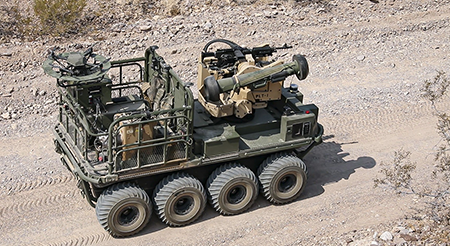UN Moves to Expand Autonomous Weapons Discussions
December 2024
By Michael T. Klare
The UN General Assembly mandated new international consultations intended to advance slow-moving negotiations on a treaty or agreement that would regulate autonomous weapons systems.

In a resolution adopted Dec. 2, the assembly said informal talks among member states and nongovernmental organizations should be held in New York in 2025 to consider the dangers posed by autonomous weapons systems, often called “killer robots” by critics, and possible measures for their control.
The vote was 166-3 with 15 abstentions. It quickly followed action by the UN First Committee which approved the resolution 161-3 with 13 abstentions on Nov. 5.
The Campaign to Stop Killer Robots, an umbrella organization for other civil society activists on this issue, described the resolution as a “small step” forward. It expressed disappointment that “the resolution does not reflect the clear desire of the majority of the international community to urgently launch negotiations on a legal binding instrument on autonomous weapons systems.”
In statements submitted to the UN secretary-general pursuant to a 2023 UN resolution on this topic, many governments and nongovernmental organizations expressed frustration that the group of governmental experts created by the Convention on Certain Conventional Weapons to develop international restraints on autonomous weapons systems has not achieved any notable progress after years of deliberation. (See ACT, October 2024.)
Meanwhile, Israel’s reported use of autonomous weapons systems and artificial intelligence (AI) tools in Gaza has “shown the devastating and unacceptable harm that can result from seeking to increase the speed of violence through AI and automation,” the Campaign to Stop Killer Robots said. The group also noted that U.S. and Russian weapons programs show “that countries are already looking to compete for military advantage through increasing autonomy in weapons systems.”
Alexander Kmentt, the director of disarmament, arms control, and nonproliferation in the Austrian Foreign Ministry and a key figure in deliberations on the First Committee resolution, also expressed regret that the final text only authorized two days of consultations and lacked a more explicit focus on crafting international regulations.
But Kmentt welcomed the new venue for discussions. “I believe that the urgency about integrating autonomy into weapons systems is such that we need to really elevate the issue much higher on the political agenda,” he told Arms Control Today.
The expert group discussions “must certainly progress to negotiations on a legally binding instrument as soon as possible but, in addition to this, we also need to generate momentum for the need for regulation in other relevant forums as well, such as the UN General Assembly,” Kmentt said.
Similar to the 2023 UN directive on autonomous weapons systems, the new resolution expresses concern “about the possible negative consequences and impact of autonomous weapon systems on global security and regional and international stability, including the risk of an emerging arms race, [and] lowering the threshold for and escalation of conflicts.” (See ACT, December 2023.)
While noting that considerable international attention has been focused on these dangers by governments and civil society organizations, the resolution warned that the development of autonomous weapons systems has been occurring at a faster pace than efforts to adopt reasonable controls.
The governmental and civil society submissions to the secretary-general also raised concerns that the expert group had not adequately addressed ethical and moral issues raised by the deployment of machine combatants governed by AI with a capacity to take human lives.
To address these concerns, the resolution calls on the secretary-general to facilitate “informal consultations” next year intended to “further the international community’s understanding of the issues involved by discussing the full range of views received, including proposals and relevant aspects raised in the report that may thus far not have been discussed in detail” in the experts group.
The consultations are to be held over a two-day period.
